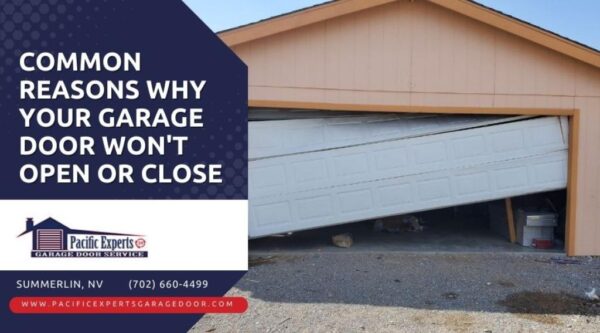A fully functional garage door is not just a convenience but a crucial aspect of your daily routine. It ensures the safety of your property and loved ones while providing easy access to your vehicles and storage. However, the moment your garage door refuses to cooperate, you're faced with a host of inconveniences and potential dangers. In this comprehensive guide, we'll delve deep into the common reasons why your garage door won't close or open and explore effective solutions to restore its functionality, including when it is time to call a garage door service and repair company. Don't let a malfunctioning garage door disrupt your life; let's troubleshoot and resolve these issues together.
- Common Causes and Solutions
- Photo Eye Sensor Issues
- Power and Electrical Issues
- Manual Lock Engagement
- Remote Control and Transmitter Issues
- Track Misalignment
- Broken Tension Springs
- Additional Factors to Consider
- Trust in Pacific Experts Garage Door Repair Spring Valley
- Frequently Asked Questions
- How often should I inspect my garage door for potential issues?
- Are there any DIY solutions for common garage door problems?
- How do weather conditions affect the functionality of my garage door?
- When should I consider replacing my garage door instead of repairing it?
- How can I ensure the longevity and durability of my garage door?
Common Causes and Solutions
In the world of garage door malfunctions, knowledge is power. Understanding the common causes behind your garage door's refusal to open or close is the first step toward resolving these issues swiftly and effectively. In this section, we'll explore the most frequent culprits behind garage door problems and provide practical solutions.
Photo Eye Sensor Issues
The photo eye sensor is a vital safety component of your garage door system. It uses an invisible beam to detect any obstacles in the door's path, preventing accidents and damage. However, even the most reliable technology can encounter issues. Common problems include:
- Obstruction: Objects blocking the sensor's beam can trigger a malfunction.
- Misalignment: If the sensors are not perfectly aligned, they may not communicate effectively.
- Dirt Accumulation: Dust and debris can accumulate on the sensor's lenses, affecting its performance.
- Physical Damage: Harsh weather conditions or accidental impacts can damage the sensors.
Solution: To address these issues, start by cleaning the sensor's lenses with a soft, lint-free cloth to ensure a clear path for the beam. If misalignment is the culprit, gently adjust the sensors until they align perfectly. If these DIY steps don't resolve the problem, it's advisable to seek professional replacement to ensure your garage door's safety features are fully functional.
Power and Electrical Issues
Before diving into complex troubleshooting, it's crucial to check the basics. Ensure that your garage door opener is securely plugged into a working electrical outlet. If it's not, re-plug it in. Next, inspect the circuit breaker for any power outages or tripped switches.
Solution: If the opener has become unplugged, simply plug it back in and test your garage door's operation. In the case of a tripped breaker, reset it and monitor your door's performance. If electrical issues persist, consider consulting a professional electrician to inspect for faulty outlets or wiring problems.
Manual Lock Engagement
Many garage doors are equipped with manual locks designed to enhance security. However, these locks can inadvertently prevent the door from opening when engaged. This situation often leads to confusion and frustration.
Solution: To disengage the manual lock, locate the lock handle or knob usually located on the inside of the garage door. Turn it counterclockwise to unlock the door. This simple step can save you the hassle of dealing with a seemingly non-responsive door.
Remote Control and Transmitter Issues
Remote controls are the gateway to effortless garage door operation, but they are not immune to problems. Common issues include:
- Dead Batteries: Over time, remote control batteries can become depleted.
- Desynchronization: The remote control may become out of sync with the garage door opener.
Solution: Begin by replacing the remote's batteries with fresh ones. If this doesn't resolve the issue, consult your owner's manual for instructions on resetting and reprogramming the remote. These straightforward steps can restore your remote's functionality and ensure that you can open and close your garage door conveniently.
Track Misalignment
The garage door's track plays a crucial role in guiding its movement. Signs of misalignment include:
- Grinding Noises: When the door moves, you may hear unsettling grinding or scraping sounds.
- Uneven Door Movement: The door may move unevenly, binding or getting stuck at certain points.
Solution: To address track misalignment, start by loosening the bolts that secure the track to the frame slightly. This allows you to gently adjust the track until it is perfectly aligned. Once realigned, retighten the bolts securely. If you encounter persistent issues or if the track appears damaged, it's advisable to seek professional inspection and potential lubrication to ensure smooth door movement.
Broken Tension Springs
Tension springs are essential components of your garage door's movement system. These springs bear the weight of the door, making it possible to open and close smoothly. However, when these springs break or show signs of wear, they can pose a danger to you and your property.
Solution: It is strongly recommended not to attempt spring replacement yourself, as it can be extremely dangerous. Instead, enlist the services of a professional garage door technician who has the expertise and proper tools to safely replace the springs. Regular inspections can help detect issues early and prevent unexpected failures, ensuring your garage door operates safely.
Additional Factors to Consider
Regular maintenance is key to ensuring your garage door's longevity and optimal performance. Beyond the specific issues mentioned above, several additional factors can affect your garage door's functionality:
- Weather Conditions: Extreme temperatures, humidity, and harsh weather conditions can impact the door's operation and longevity.
Solution: Implement a regular maintenance schedule that includes lubrication, tightening hardware, and inspecting for signs of wear. Address issues promptly, and schedule professional inspections as needed.
Trust in Pacific Experts Garage Door Repair Spring Valley
Addressing garage door issues promptly is crucial to maintaining your daily routine and safety. In Las Vegas, Nevada, you can rely on Pacific Experts Garage Door Repair Spring Valley for all your garage door needs. With their expertise, comprehensive services, and unwavering commitment to customer satisfaction, you can trust this garage door repair company to resolve any garage door problem efficiently, ensuring your garage door operates flawlessly.
Frequently Asked Questions
How often should I inspect my garage door for potential issues?
Regular inspections every six months are recommended to catch and address issues early. Additionally, perform visual checks more frequently to ensure smooth operation.
Are there any DIY solutions for common garage door problems?
Yes, there are DIY solutions for common issues, as outlined in this guide. However, for complex problems or if you're unsure, it's advisable to consult professionals to avoid further complications.
How do weather conditions affect the functionality of my garage door?
Extreme temperatures, humidity, and harsh weather can impact the door's operation and longevity. Weatherproofing, proper insulation, and maintenance can mitigate these effects.
When should I consider replacing my garage door instead of repairing it?
Consider replacement if your garage door is old, extensively damaged, or if the cost of repairs approaches the cost of a new door. New doors may also offer enhanced safety and energy efficiency.
How can I ensure the longevity and durability of my garage door?
To ensure your garage door's longevity and durability, implement a regular maintenance schedule that includes lubrication, hardware inspection, and weatherproofing. Address issues promptly and schedule professional inspections as needed.



